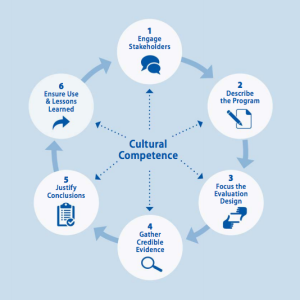New CDC resource on culturally competent evaluation
The CDC has released a new guide, Practical Strategies for Culturally Competent Evaluation. The guide defines cultural competence as, “…a set of congruent behaviors, attitudes, and policies that come together in a system, agency, or among professionals and enables effective work in cross-cultural situations.” Evaluation grounded in these principles is critical, because “approaching an evaluation with a critical cultural lens [ensures] that evaluation efforts have cultural relevance and generate meaningful findings that stakeholders—individuals who are invested in the program or potentially affected by the evaluation—ultimately will value and use.”

Using the six-step CDC evaluation framework in the picture, the guide breaks down ways to ensure that an evaluation is considerate and respectful of culture throughout the entire evaluation process. The guidance in the document is specific and truly practical, from a list of questions to help assess and acknowledge our own cultures and identities and how they might impact evaluation processes, to understanding the social and historical context in which a program occurs, to ways to ensure that the evaluation is engaging diverse stakeholders who represent the diversity of program participants and broader communities, to tips for how identify and minimize power imbalances related to cultural difference, to making the evaluation reflect stakeholders’ values. The guiding questions throughout are also a great way to help apply the concepts discussed to individual programs.
Anyone looking to do an evaluation can use this great resource, because in every group of program staff, participants, stakeholders, and communities, there is cultural diversity to respect, value, and learn and grow from.
